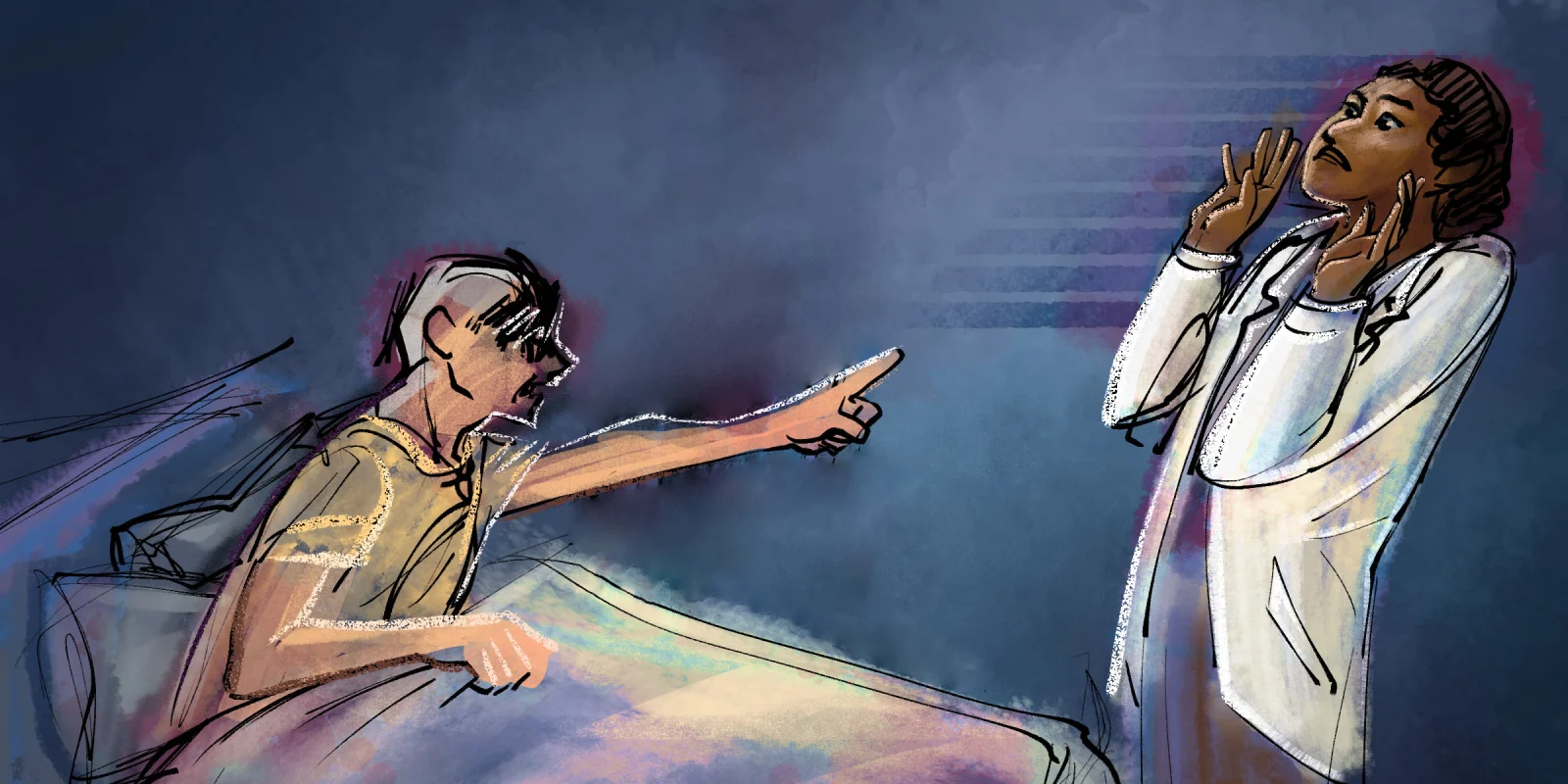It started with the usual request from a resident to check up on a patient and confirm his history. I introduced myself, and the patient and I talked about what brought him to the hospital: leg pain/edema and lymphadenopathy. As I was wrapping up the history, I began the physical exam: auscultating his heart and lungs as well as carefully examining his leg for signs of infection, extent of swelling, and lymphadenopathy. After finishing the exam, I thanked the patient for speaking with me and instructed him to wait for the attending physician if he had any further questions. This was when things started to take a turn.
As I was beginning to walk away, the patient pressed me for an assessment and plan. After an initial period of confusion as to why a patient was asking me this, I calmly explained to him what I suspected was contributing to his symptoms and what the team’s next steps were going to be, mainly to obtain an MRI. He continued to shock me as he began to “pimp” me. “What are the three causes of lymphadenopathy?” he asked in a stern and authoritative manner. I explained that lymphadenopathy can be due to malignancy or infection and struggled to think of a third answer. He finished by stating that STIs can also contribute to lymphadenopathy. I finished our conversation by asking if he had a background in medicine, to which he answered that he had a PhD in the humanities. At this point, I knew I needed to exit the room. I had never met a patient who felt entitled enough to pimp a medical student and belittle them while having no background in medicine.
I was not sure what to prepare for on my way to his room again. I knew I needed to finish the errand, namely figure out why he was having issues getting the MRI done. I had called the MRI department and was informed that due to his history of having metal implanted in his left orbital area, they were waiting on an X-ray for clearance. I also saw a note in his chart from an imaging technician mentioning a pacemaker, which was not consistent with his known history. Therefore, I was on my way to clarify these things.
When I entered the room for the second time, the patient was already in a foul mood. I went on to ask him for more information on the metal in his eye and was met with pure rage. He raised his voice and told that the metal was from a work-related injury and had been surgically removed over 30 years ago. He yelled that he’d already clarified this many times with other health care personnel and was not sure why we were not communicating with each other. I then asked him for more clarity on whether he had a pacemaker, as there was a contradictory note in his chart. This made him even more furious, and he began to exclaim that I was not qualified to become a physician as I was not capable of familiarizing myself with a patient’s history. I tried to deescalate the situation by letting him know that no one had informed me of this information and that I was just trying to get more clarity on the MRI issue, so he could be one step closer to going home. It was not an issue of not knowing his history but of trying to understand why these questionable notes were in his chart. I emphasized that I was on his side and prioritized his care first and foremost.
None of what I was saying made any difference. He continued to be displeased and began to coach me on what appropriate bedside manner is supposed to look like. It was a demeaning conversation. I said and did everything I could but was only met with derogatory comments about my capabilities as an aspiring physician. In the meantime, the imaging technicians dropped by to complete the orbital X-ray. As soon as they arrived in the room, he began to yell at them as well, saying he refused to have it done. After they exited the room, the resident who instructed me to complete this errand met with me.
When I re-entered the patient’s room with the resident, his attitude had changed. Although he was frustrated about the situation, he treated the resident with respect and cooperated with his questioning. I was not sure why there was a difference. The resident was saying similar things as I had, yet was treated vastly differently. The only conclusion I could come to was that my mistreatment occurred because I was a medical student. How could it be justified to treat a student in such a demeaning and humiliating manner, I wondered.
The situation only worsened from there. During morning rounds the next day, I would learn, the patient tarnished my character and potential as an aspiring physician in front of the whole team while I was absent. Why? The patient understood that the attending physician was my supervisor and evaluator in my medical school career. He fully intended to leave a negative impression of me to my evaluator in what could only be described as a selfish, spiteful, and prideful manner. I could not comprehend how our encounter could warrant damaging my grades and my future aspirations. It upset me that this patient had no comprehension of all the hard work that went into being a third-year medical student, and yet felt entitled to damage my medical career. I tried to brush it off as him just being a bitter and dissatisfied patient who was having an unpleasant stay and that it had nothing to do with my character or abilities as an aspiring physician. However, it shook my confidence.
During this situation, I had tried my best at handling a difficult patient, knowing that I would be inevitably dealing with many in my career, but I was nevertheless disappointed in my inability to reason with him. After talking to classmates and my clerkship director about this, I was comforted in hearing that there will always be disgruntled patients no matter how much you try to provide the best care, and that you cannot allow that to affect your self-image as a clinician. These kinds of challenges will always be encountered, but all that can be done is to view them as learning experiences and move on. In these situations, solace can be found in believing that you are still a devoted, caring, and capable physician.
Unfortunately, my experience is not an unusual one. Medical student mistreatment is a commonly faced issue and almost considered part of our training. It has a prevalence of 59.6% according to one meta-analysis, with patients or their families (21.9%) cited as the second most common source of abuse after consultants (34.4%). Mistreatment has been found to reduce self-esteem and confidence, and can lead to burnout and emotional and psychological disturbances. It can also have negative effects on career choice, with mistreated students being less likely to plan a full-time career in medicine. How can we try to combat this?
One suggestion is to have clinical supervisors introduce students as members of the team, thereby informing patients and their families that the medical student is a clinician too. Banners and posters can also be used in wards and clinics as reminders against mistreatment and actions to take. Additionally, patients who are known to mistreat medical students can be identified to avoid any clinical encounter or incur supervision if the encounter is inevitable. This algorithm has also been proposed.
With medical student mistreatment so prevalent, the question arises as to whether professional boundaries should be enacted for patients. Yes, patients can be in an emotionally and physically taxing situation with their illness, but that does not justify bullying students and other clinicians. Many consider this behavior just another hurdle in a medical career, but I am positive that changes can be made for the next generation of health care practitioners. In fact, they must.
What suggestions do you have for reducing medical student mistreatment? Share in the comments below!
Mevelyn is a fourth-year medical student at Mercer University SOM. She is pursuing a residency in internal medicine.
Mevelyn's attending, Dr. Maulik A. Patel, provided editing/framing for this piece.
Patient identifying details have been changed to protect their privacy.
Illustration by April Brust







